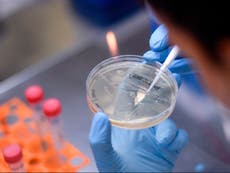Antibody that could neutralise coronavirus found by University of Pittsburgh
Experimental drug could be administered by inhalation or a spiky plaster-like patch, researchers say
Your support helps us to tell the story
From reproductive rights to climate change to Big Tech, The Independent is on the ground when the story is developing. Whether it's investigating the financials of Elon Musk's pro-Trump PAC or producing our latest documentary, 'The A Word', which shines a light on the American women fighting for reproductive rights, we know how important it is to parse out the facts from the messaging.
At such a critical moment in US history, we need reporters on the ground. Your donation allows us to keep sending journalists to speak to both sides of the story.
The Independent is trusted by Americans across the entire political spectrum. And unlike many other quality news outlets, we choose not to lock Americans out of our reporting and analysis with paywalls. We believe quality journalism should be available to everyone, paid for by those who can afford it.
Your support makes all the difference.An antibody that could be effective in neutralising coronavirus has been found by researchers at the University of Pittsburgh School of Medicine (UPMC).
Scientists isolated “the smallest biological molecule” that “completely and specifically neutralizes" SARS-CoV-2, which causes the novel coronavirus, according to a report released on Monday.
The antibody, which is 10 times smaller than a full-sized antibody, has been used to create a drug named Ab8 that researchers hope might be able to prevent and treat the virus.
Researchers reported that the drug has so far proven “highly effective in preventing and treating SARS-CoV-2 infection" in mice and hamsters.
The drug has also shown signs that it won’t have negative side-effects in people, as it does not bind to human cells, researchers said.
“Ab8 not only has potential as therapy for Covid-19, but it also could be used to keep people from getting SARS-CoV-2 infections,” said co-author John Mellors, chief of the Division of Infectious Diseases at Pitt and UPMC. Xianglei Liu of Pitt is also co-lead author of the study.
“Antibodies of larger size have worked against other infectious diseases and have been well tolerated, giving us hope that it could be an effective treatment for patients with Covid-19 and for protection of those who have never had the infection and are not immune," Dr Mellors added.
Notably, researchers said that they are “thinking outside the box” in how the drug could be administered. The report suggested that alternative routes for administration may be possible, including inhalation or a spiky plaster-like patch.
“Its small size might allow it to be given as an inhaled drug or intradermally, rather than intravenously through an IV drip, like most monoclonal antibodies currently in development,” the report says.
During initial tests, even at the lowest dose, Ab8 decreased by 10-fold the amount of infectious virus in those mice compared to those who were untreated.
“The Covid-19 pandemic is a global challenge facing humanity, but biomedical science and human ingenuity are likely to overcome it,” said Dr Mellors, also Distinguished Professor of Medicine, who holds the Endowed Chair for Global Elimination of HIV and AIDS at UPMC.
“We hope that the antibodies we have discovered will contribute to that triumph.”





Join our commenting forum
Join thought-provoking conversations, follow other Independent readers and see their replies
Comments